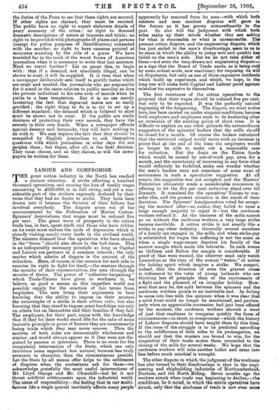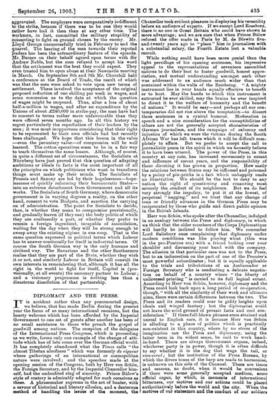LABOUR AND COMPROMISE.
T"great cotton industry in the North has reached a curious situation. A strike affecting a hundred thousand operatives, and causing the loss of weekly wages amounting to pe130,000, is in full swing, and vet a con- siderable part of the strikers expressly declared by their votes that they had no desire to strike. They have been drawn into it because the decision of their fellows has involved. everybody. The dispute arose out of the announcement by the Federation of Master Cotton- Spinners' Associations that wages must be reduced five per cent. The great wave of prosperity in the cotton trade has, in fact, spent itself, and those who have ridden on its crest must endure the cycle of depression which is already visiting nearly every trade in the civilised world. The masters demand that the operatives who have shared in the " boom " should also share in the bad times. This is an indisputably necessary principle so long as Capital and Labour are partners in a common interest; the only matter which admits of dispute is the amount of the reduction. here, of course, is the occasion for each side to exercise its right to fight for itself, —the masters through the mouths of their representatives, the men through the mouths of theirs. The power of "collective bargaining" which Trade-Unions have given to workmen is, we believe, as good a means as this imperfect world can possibly supply for the exaction of fair terms from employers. The men bring their arguments to bear knowing that the ability to impose on their masters the catastrophe of a strike is their ultima ratio, but also knowing that they stand to impose great hardships not only on others but on themselves and their families if they fail. The employers, for their part, argue with the knowledge that if they let their works stand idle for the sake of some fantastic principle or point of honour they are unnecessarily losing trade which they may never recover. Thus the motives of both sides are economically wholesome and similar, and would always appear so if they were not dis- guised by passion or ignorance. There is no room for the compulsory intervention of the State, which can only introduce some expedient less natural, because less truly economic in character, than the circumstances provide. Let the State by all means offer helps to the settlement of disputes when the contestants ask for them—we acknowledge gratefully the most useful interventions of Mr. Lloyd George and Mr. Churchill—but let it not thrust artificial arbitraments upon the industrial world. The sense of responsibility—the feeling that in our multi- farious life a single quarrel inevitably affects many people apparently far removed from its area—with which both masters and men conduct disputes will grow fe. the future as it has grown extraordinarily in the past. So also will the judgment with which both sides make up their minds whether they are asking for what is reasonable or what is unreasonable. The present cotton dispute, and the engineering dispute, which has just ended to the men's disadvantage, seem to us to be cases in which the ability to judge well and quickly has failed on the men's side. But we do not taki either of them—not even the long-drawn-oat engineering dispute-e, as a sign that the Board of Trade needs, as is being said by some ardent souls, new machinery for imposing its will on disputants, but only as one of those expensive incidents which build up experience, and which, we hope, in the long run will make both Capital and Labour proof against mistakes too expensive to themselves.
The first resistance of the cotton operatives to the proposal that their wages should be reduced five per cent. was only to be expected. It was the perfectly natural beginning of the bargaining. The dispute, we must notice here, has been carried on under singuier conditions, because both employers and employees seem to be hankering taw an extension of the existing policy of short time. It is difficult to explain on any other grounds the extraordinary suggestion of the spinners' leaders that the mills should. be closed for a month. Of course the leaders calculated that the restricted output would cause such an increase i4 prices that at the end of the time the employers would no longer be able to make out a, reasonable case for reduction. But the drain on the Union Nude which would be caused by out-of-werk _pay, even for * month, and the uncertainty of recovering in any form what would definitely be forfeited, make one wonder whether the men's leaders were not conscious of some want of seriousness in such a speculative suggestion. At all events, the suggestion was not accepted, and the Masters' Federation ultimately made a considerable .concession in offering to let the five per cent. reduction stand over till January. It remained for the operatives' Unions to con- sider this, and the present situation is the result of their decisions. The Spinners' Amalgamation voted for accept- ing the masters' offer—or, rather, they failed to raise a large enough majority to reject it—but the eardroont workers refused it. As the business of the mills cannot go on without the cardroom workers, a very large strike became inevitable. A cotton strike is not exactly like a, strike in any other industry. Generally several members of a family are engaged in the mills, and when strike-pay is substituted for wages the suffering is not the same as when a single wage-earner deprives his family of the narrow margin which made life tolerable. In such towns as Oldham and Bolton the margin is considerable. If proof of that were wanted, the observer need only watch Lancashire at the time of the annual " wakes," or notice the holiday spirit which inspires a strike. We suspect, indeed, that the direction of even the gravest ens* is influenced by the votes of young hotheads who are thinking less of principle than of the excitements of a fight and the pleasure of an irregular holiday. How- ever that may be, the split between the spinners and the cardroom workers points to an inevitable end. In failing to come into line with the spinners when it was clear tW a solid front could no longer be maintained, and particu- larly when an appreciable concession had just been offered. by the masters, the cardroom workers showed a want of just that- readiness to recognise quickly the force of circumstances--in short, to compromise—which the history of Labour disputes should have taught them by this time. If the issue of the struggle is to be predicted according to the indifference of both sides to its prolongation, we should say that the masters are bound to win, for the stagnation of their trade makes them reconciled to the closing of the mills for several weeks. We hope that the cardroom workers will take another ballot and come into line before much mischief is wrought.
The other dispute in which the judgment of the workmen has also turned to their disadvantage is that in the engi, neering and shipbuilding industries of Northumberland, Durham, and the North -Riding. Seven months ago the workers struck when trade was beginning to decline,—the conditions, be it noted, in which the cotton operatives have struck, only that the slackness of trade is new even MOM aggravated. The employers were comparatively indifferent to the strike, because if there was to be one they would rather have had it then than at any other time. The Workmen, in fact, committed the military stupidity of Pnwenting to fight on ground chosen by the enemy. Mr, Lloyd George unsuccessfully tried in February to end the quarrel. The bearing of the men towards their reputed leaders has been the extraordinary feature of the episode. ;VIr. Barnes on their behalf agreed upon terms with Sir Andrew Noble, but the men refused to accept his word that the settlement was the best they could expect. They even treated him to open abuse at their Newcastle meeting in March. On September 8th and 9th Mr. Churchill held a conference at the Board of Trade, the malt of which was that the men were asked to vote upon new terms of settlement. These involved the acceptance of the original proposed reduction of one shilling per week in wages, and Some concession as to the date at which the question of wages might be reopened. Thus, after a loss of about half-a-million in wages, and after an expenditure by the Unions of about £240,000 in strike-pay, the men have had to consent to terms rather more unfavourable than they Were offered seven months ago. In all this history we regret particularly the repudiation of their leaders by the men; it was most inopportune considering that their right to be represented by their own officials had but recently been challenged. We hope that this lesson in the value —even the pecuniary value—of compromise will be well learned. The cotton operatives seem to be in a fair way to teach themselves the same lesson. Although, of course, in quite a different set of circumstances, the Socialists at Nurnberg have just proved that this question of adapting ambitions or ideals to facts is the most important of all the principles on which politicians who want to transform things must make up their minds. The Socialists of Prussia and Saxony are led by their hopelessness—hope- lessness of quickly reforming their bureaucratic States— into an extreme detachment from Government and all its works. The Socialists of South Germany, where democratic government is in varying degrees a reality, on the other hand, consent to vote Budgets, and sanction the carrying on of administration. The point for Socialists to decide, then, is whether they mean to compromise provisionally, and gradually leaven (if they can) the body politic of which they are confessedly a part, or whether they prefer to remain a foreign ingredient, incapable of assimilation, waiting for the day when they will be strong enough to sweep away the existing regime in one coup. That is the Same question expressed in political terms which Labour has to answer continually for itself in industrial terms. Of course the South German way is the only humane and Civilised way. The Bavarians and the other Southerners realise that they are part of the State, whether they wish it or not, and similarly Labour in Britain will consult its Own interests in remembering that, although it has all the right in the world to fight for itself, Capital is (pro- visionally, at all events) the necessary partner to Labour; and a visionary programme is nothing less than a, disastrous dissolution of that partnership.











































 Previous page
Previous page